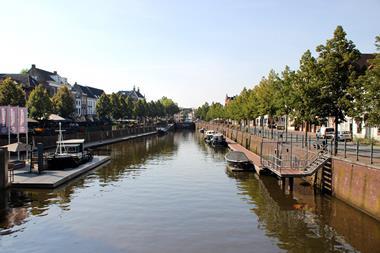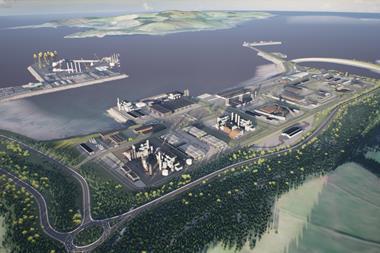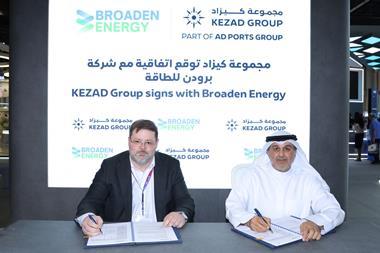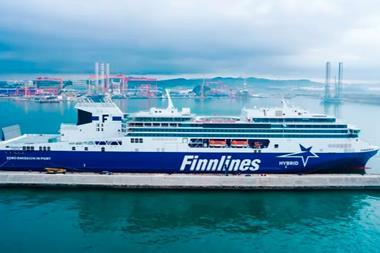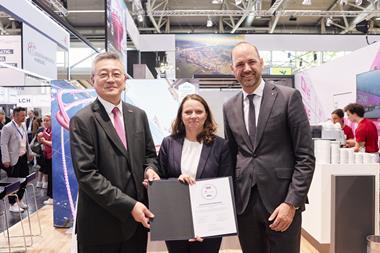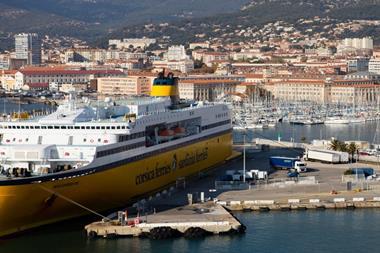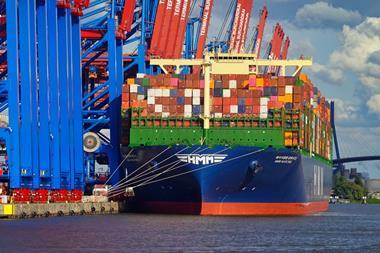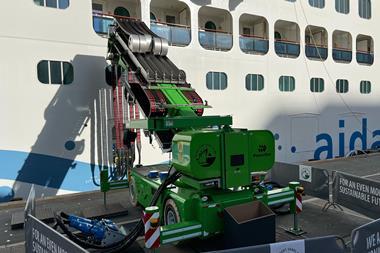In this article Jinwon Choi, deputy general manager and Woojung Choi, assistant manager at Ulsan Port Authority (UPA), explain to GreenPort how the port is working to transition from an oil logistics centre to a clean energy hub.
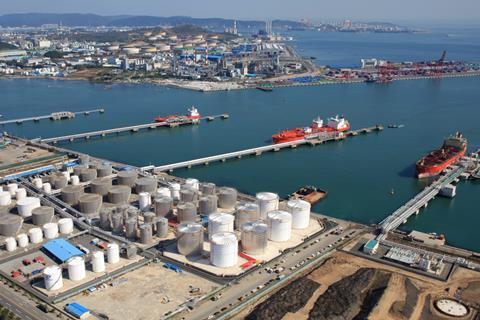
Ulsan Port is leveraging its established position as a premier oil logistics hub to expand its capabilities in clean energy, with the goal of becoming a leading energy logistics hub in the Asia-Pacific region.
The transition to alternative marine fuels is a key priority, progressing in phases - from low-carbon fuels such as LNG, methanol and biofuels in the near term to zero-carbon options like hydrogen and ammonia in the long term.
To address the rising demand for low-carbon fuels, UPA is actively investing in critical infrastructure, including the construction of LNG storage tanks, dedicated berths and strategic equity stakes in methanol-exclusive storage facilities.
Additionally, Ulsan Port is a key participant in the development of a green shipping corridor linking Busan and Ulsan with Seattle and Tacoma in the United States. This initiative will facilitate the deployment of methanol-powered vessels, reinforcing the port’s role in advancing sustainable maritime operations.
Alternative fuels
For zero-carbon fuels, Ulsan is at the forefront of ammonia bunkering development, contributing to the formulation of safety regulations and supporting pilot projects to ensure practical implementation.
Simultaneously, to accelerate hydrogen infrastructure readiness, the port is conducting preliminary demand assessments with upstream business operators.
To further encourage the adoption of sustainable fuels, Ulsan Port offers incentives for eco-friendly vessels by reducing port dues, ensuring that ships utilising alternative fuels benefit from cost savings while contributing to greener shipping practices.
With a structured, long-term roadmap for each energy source, Ulsan Port is steadily positioning itself as a global leader in the alternative marine fuel supply chain, driving the decarbonisation of the maritime industry.
And this aligns at the national level, because the Korean government has taken proactive steps to advance the alternative marine fuel industry.
In November 2023, the country introduced the Alternative Marine Fuel Supply Chain Development Plan, officially designating Ulsan Port as a strategic hub for eco-friendly marine fuels.
This initiative aims to stimulate and sustain demand by ensuring that a significant share of both domestic and international alternative fuel needs is met through public-sector-led efforts. This approach aligns seamlessly with Ulsan Port’s long-term vision of leveraging its established strengths in liquid logistics to position itself as a global leader in clean energy bunkering.
On the private sector side, the transition to alternative fuels is accelerating in response to tightened IMO regulations and growing industry demand for sustainable energy solutions.
To remain at the forefront of this shift, Ulsan Port is actively expanding its fuel supply infrastructure while also working to identify and cultivate new sources of demand.
With strong policy backing, private-sector investment, and coordinated demand-generation efforts, Ulsan Port is well on track to solidifying its role as a premier hub for eco-friendly marine fuel supply in the Asia-Pacific region.
Energy strategy
UPA is advancing its energy strategy by carefully assessing the characteristics, feasibility and market readiness of various alternative marine fuels.
Among its current initiatives, LNG stands out as the most actively developed alternative fuel, given its widespread adoption and role as a transitional energy source while the economic and technological challenges of methanol and ammonia are being addressed.
To support the expansion of LNG bunkering, UPA has been making strategic investments since the early 2020s to build a robust supply infrastructure.
A key milestone in this effort is Phase 1 of the Northeast Asia Energy Hub Project, which has positioned Ulsan as a critical clean energy logistics hub, with LNG playing a central role. With
Phase 1 is now operational with new cargo volumes being generated and Ulsan is actively working to attract investments for additional LNG storage capacity to meet growing demand.
Additionally, to facilitate the increasing adoption of LNG in global shipping, Ulsan Port is establishing joint ventures to enhance LNG bunkering operations, supporting the development of standard operating procedures (SOPs) to ensure efficiency and safety and implementing targeted growth initiatives to accelerate LNG bunkering industry development.
Through these initiatives, Ulsan Port is reinforcing its position as a leading clean energy hub, paving the way for a seamless transition to next-generation fuels.
Storage strategy
As part of its commitment to accelerating the supply of eco-friendly marine fuels and supporting the global transition to sustainable shipping, UPA acquired a strategic stake in Hyundai Oil Terminal in 2023. This partnership enhances Ulsan’s capability to develop a robust fuel storage and export infrastructure, positioning the port as a major hub for alternative fuels.
Leveraging Hyundai Oil Terminal’s newly expanded tank facilities, Ulsan is establishing the necessary infrastructure to supply green methanol and bio-marine fuels to vessels. To support this initiative, UPA is actively conducting global marketing efforts to secure partnerships with clean energy producers and attract demand from leading shipping companies.
Recognising ammonia as a next-generation marine fuel, Ulsan Port also plans to develop dedicated ammonia storage facilities within Hyundai Oil Terminal’s site. This project will enable the port to meet both domestic and international demand while assessing ammonia’s feasibility as a viable bunkering fuel.
Through these strategic initiatives, Ulsan Port is strengthening its position as a global leader in alternative marine fuel supply, reinforcing its role in the decarbonisation of the shipping industry.
Infrastructure
As Ulsan Port continues to develop alternative fuel infrastructure, including dedicated bunkering berths, standard operating procedures and pilot projects, it is also integrating clean energy solutions into its own operations to enhance sustainability.
On the infrastructure side, the port has implemented Alternative Maritime Power (AMP) systems to provide shore-side electricity for LNG spill response vessels, reducing reliance on conventional fuels and supporting eco-friendly operations within the port.
For port vessels, Ulsan is actively supporting a hybrid tugboat transition project, to facilitate this transition, the port is establishing refueling infrastructure incorporating green technologies, ensuring the seamless operation of these eco-friendly vessels.
Ultimately, the port aims to significantly reduce its own emissions through the adoption of solar energy and alternative fuels while positioning itself as a global benchmark for sustainable port operations.
Looking ahead
Ulsan Port’s alternative fuel initiatives are a cornerstone of its long-term sustainability strategy, aligning with its key objectives of reducing carbon emissions, fostering a more sustainable port system, and establishing a reliable alternative fuel supply chain.
To drive this transition, the port is progressively expanding infrastructure for LNG, methanol, hydrogen and ammonia, supporting the maritime industry’s shift toward eco-friendly fuels. These efforts not only align with global decarbonisation targets but also mark a necessary evolution toward sustainable port operations.
Beyond environmental impact, these initiatives contribute to Ulsan Port’s long-term competitiveness by positioning the port as a key player in energy logistics and a catalyst for regional and national economic growth.
A pivotal aspect of this strategy is the integration of alternative fuel projects into the Northeast Asia (and broader APAC) Energy Hub Project. This initiative is more than just an environmental commitment, it’s a strategic move to:
✔ Develop a robust alternative fuel supply chain to support the shipping industry’s energy transition
✔ Strengthen Ulsan’s leadership in both domestic and global energy logistics
✔ Enhance fuel trading, storage and distribution sectors, reinforcing Ulsan’s position as a major maritime energy hub.
In summary, Ulsan Port’s alternative fuel initiatives are not just about sustainability, they are a dual strategy to drive both environmental responsibility and economic growth, ensuring the port’s continued leadership in the evolving global shipping industry.








